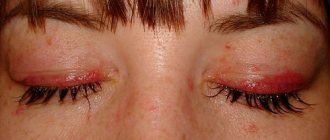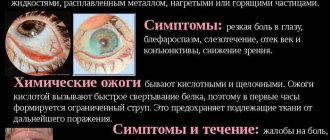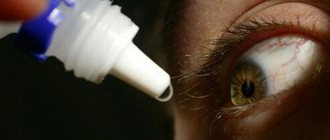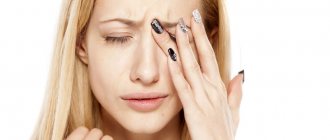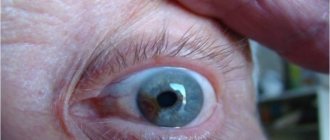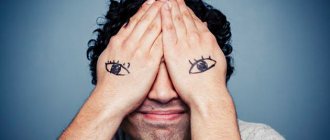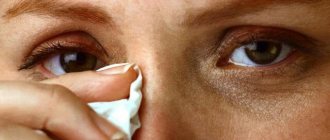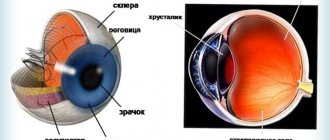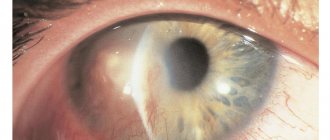We have all been in a situation at least once in our lives when shampoo got into our eyes while washing. Do you feel familiar? Our organ of vision is very sensitive, even a very small portion of a detergent can cause significant harm to it, which, naturally, will lead to various complications. What to do in such a situation? Let's try to figure it out.
Reference. If shampoo gets into your eyes, do not rub them with your hands, but rinse them immediately. If irritation persists for several hours, you should use special drops or consult a doctor.
Shampoo gets in your eyes - is it dangerous?
Maintaining hygiene is a necessary procedure. But all the products that are available on store shelves, although aimed at maintaining cleanliness and health, are dangerous to health. It is no coincidence that manufacturers warn about the danger of contact of compounds with mucous membranes. The consequences are especially pronounced for allergy sufferers.
If headaches begin when the shampoo comes into contact with the eyes, most likely there is an intolerance to the constituent substances. If you rinse them immediately with water, there are usually no consequences. If the irritation continues from a day to two or more, then an infection may have been introduced along with the water used for rinsing. It is likely that such irritation occurred as a result of the towel being applied to the eyelids. In such situations, it is better to visit a doctor so that he can recommend drops or other medications against inflammation.
Important! To avoid complications, it is better to consult an ophthalmologist without delay.
Prevention of injuries in children
Adults should be responsible for the health of children, always be nearby and control their pastime. Household chemicals (cleaning products, shampoos, powders, vinegar essence, potassium permanganate) should be kept out of reach of children. All bottles and packaging must be labeled. It is important to conduct preventive conversations with children - explain in an accessible and detailed manner about the dangers of playing with household chemicals. It is important to convey information that improper handling can cause irreparable harm to the child.
Why does shampoo sting my eyes?
What is it about shampoo that makes it unpleasant to get into your eyes? Let's look at the composition:
- plain water;
- various flavored additives (optional);
- active elements;
- alkali.
Almost any component, except perhaps water, can cause a burning sensation. Once on the mucous membrane, such substances irritate it, after which all these unpleasant sensations arise. The burning sensation can be to a greater or lesser extent - it depends on how sensitive the person’s receptors are. And the composition of the substance itself largely affects the strength of irritation.
Reference! Shampoo and soap for children contain much less alkali, and sometimes other substances that are less harmful are used instead. That is why most children and adults do not feel irritation when in contact with these products.
What to do if soap or shampoo gets in your eyes? First aid and treatment
Getting soap or shampoo into the eyes causes unpleasant sensations: burning , itching, irritation and a feeling of sand in the eyes.
In most cases it is harmless and symptoms go away within a few minutes.
To do this, you don’t even have to rinse your eyes, but if you do, the burning will go away faster.
In rare cases, such situations can lead to serious consequences.
What to do to eliminate unpleasant symptoms
If you notice that your eyes are red, do not rub them with your hands, as this can cause even more damage. If shampoo gets into your eyes, rinse them with boiled water (not boiling water). Plain tap water is not suitable for rinsing, as it may contain germs. Do not rub your eyes with your hand or a napkin - this can cause more damage to your visual organs. If the inflammation does not go away even after three hours, apply drops.
You need to instill one drop three to four times a day. It would also be a good idea to drip some vitamin B 10. But if, despite the measures taken, the irritation does not disappear after a maximum of four days, you should definitely go to the doctor. If you are not allergic to potato and sea buckthorn juice, then you can use them for instillation. A compress made from raw potatoes reduced to a porridge-like consistency is a good way to relieve swelling.
Reference. If the shampoo comes into contact with your eyes, anoint your lower eyelids with Korneregel ointment. Repeat the treatment three times a day.
Washing and applying lotions from a decoction of herbs has a good effect. This will relieve inflammation. Decoctions should be made from cornflowers, dope, you can add plantain seed and dry chamomile. It’s a good idea to add mountain honey to the decoction, but this should only be done if you are not allergic to the elements it contains. If the burning intensifies, the eyes should be rinsed with warm water.
Feelings and symptoms
If shampoo or soap gets into the eyes, the victim will experience the following symptoms :
- increased pain when looking at light sources;
- blepharospasm (involuntary closing of the eyelids);
- redness of the conjunctival membrane;
- pain and burning in the eyes;
- profuse lacrimation;
- partial loss of clarity of vision;
- swelling of the conjunctiva and eyelid tissues.
In some cases, if soap with a high concentration of alkali gets into the eyes, the color of the cornea may change .
How to prevent shampoo from getting into your eyes
The following measures will help prevent shampoo from getting into your eyes:
- Tilt your head back when washing. While rubbing in the shampoo, tilt your head back slightly, as if you want to look up. The approximate angle between the floor and the head should be forty-five degrees. With this position of the head, the foam will flow back, but not into the eyes. While washing, do not look forward or tilt your head. When rinsing, also fold it back.
- Close your eyes. While washing, try to keep your eyes open. It is quite possible to wash your hair while they are closed. After applying a portion of shampoo to your hands, close your eyes and lather your hair. And after you wash everything off of it, open them.
- Read the labels on the packaging. Look on the back of the bottle. There should be instructions recommending how to use the shampoo correctly. Sometimes the instructions are accompanied by text explaining how to avoid getting the detergent in your eyes.
- After washing, do not touch your eyes with your hands. When shampoo is rubbed into your head, it certainly comes into contact with your hands and remains on them. This is why you should not touch your eyes while showering.
- Wash your hands after washing your hair. After washing your hair, don’t be lazy to wash your hands. You can do this with soap, which is optional. The main thing is to check that there are no traces of detergent left on your hands.
- Use glasses for protection. If shampoo gets into your eyes every time you bathe, which naturally irritates you, use glasses to protect yourself. Just go to a sports store and buy swimming goggles. Wear them in the shower, and after all procedures are completed, take them off. With such protection, you will wash yourself well and nothing will pinch.
- Wash with baby shampoo. Some manufacturers sell shampoo that has neutral acidity. If such shampoo gets on the mucous membrane, you simply won’t notice it. There will be no burning or discomfort.
- Wear a protective visor. There are cap-like visors available for sale that can be used to protect your eyes in the shower. After putting it on your head, make sure that there is no gap between it and your head. This protection will help you avoid trouble.
What to do if soap gets in your eye
Compliance with basic hygiene rules is a mandatory requirement for each of us. However, sometimes, when you wash your face again, embarrassment arises. For example, when washing your face or washing your hair, soap may get into your eyes. The same problem is possible when washing dishes, with detergent ingress. Unfortunately, no one is immune from such troubles. Of course, if you encounter such a problem, you need to take certain measures. It is especially important to do this if the soap gets into the baby’s eyes. In newborns, the visual organs are especially sensitive to chemical exposure, so it is necessary to react quickly. Today we’ll talk about what to do if an adult or child gets soap or shampoo in the eye, and what consequences may arise.
Shampoo makes my eyes hurt
If shampoo gets into your eyes, it may cause burning and discomfort.
Most often, to neutralize negative symptoms, it is enough to wash with warm water, however, if the problem bothers you for longer than 1 day, it is recommended to consult an ophthalmologist.
People with allergies should approach the choice of shampoo with special care. Preference should be given to natural hygiene products that have been certified.
What are the symptoms if shampoo gets into your eyes?
There is minimal alkali and substances hazardous to the cornea in hygiene products, so a long-term negative reaction is atypical.
If deodorant, soap or shampoo gets into your eyes, you may experience the following unpleasant symptoms:
- redness of the skin;
- itching, burning;
- visual enlargement of the eyeballs;
- increased lacrimation;
- blurred vision;
- dizziness;
- swelling of the eyelids.
Is it dangerous if shampoo gets into your eyes?
A quick rinsing of the visual organs with a hygiene product will help to avoid further unpleasant manifestations.
Hygienic products are not hazardous to health, since the manufacturer provides for the possibility of substances coming into contact with open mucous membranes.
However, for people prone to allergies, especially if they have a headache after the incident, there is a risk of individual intolerance to the components of the shampoo. If you quickly wash your eyes, there will be no side effects.
Prolonged irritation for more than 1-2 days can also be caused by infection from raw water used to wash the eye, or physical impact when wiping or pressing on the eyelids with a towel.
In this case, taking drops and anti-inflammatory medications prescribed by the doctor is indicated. To prevent complications due to infection, you should promptly contact an ophthalmologist and avoid touching the damaged area.
What to do?
If the eye is red, you should not touch it to avoid infection. In the first 1-2 minutes. After contact with the hygiene product on the mucous membrane, you must wash with boiled water.
Raw tap liquid can lead to infection and the need for long-term treatment. Rubbing your eyes with a towel or your hands is prohibited, otherwise you can damage the cornea.
If after 2-3 hours the inflammation has not gone away, then you can spray the following antibacterial drops:
Albucid drops will help eliminate the remaining discomfort.
- "Levomycytin";
- "Erythromycin";
- "Albucid";
- "Interferon";
- "Penicillin";
- "Vitabact".
The optimal dosage of medications is 1 potassium 3-4 times a day. Instillation of vitamin B 10 is also effective. However, if the irritation does not go away after 3-4 days, you should definitely consult an ophthalmologist.
Among the folk remedies, potato and sea buckthorn juice are used, which must be instilled 1-2 times a day in the absence of an allergic reaction.
You can also make gauze compresses from raw potato pulp, which is effective in relieving swelling and redness of the skin.
If deodorant or shampoo gets on the mucous membranes, it is recommended to apply a thin layer of Korneregel or Hydrocortisone ointment to the surface of the lower eyelid 3 times a day. There should be no burning or discomfort.
It is recommended to wash your eyes and make lotions using natural herbs to relieve the symptoms of the inflammatory process.
It is recommended to make a mixture of cornflower flowers, datura, plantain seeds and dried chamomile. You can also add mountain honey to the decoction, but be careful not to provoke an allergy.
If the burning sensation intensifies after the compress, the eyes should be rinsed with warm water from a kettle.
2 parts: Rinse the shampoo out of your eyes with water How to prevent shampoo from getting into your eyes
Taking a shower is an important part of our daily routine. When taking a shower or bath, we often wash our hair. But if shampoo gets into our eyes during this process, we experience pain, burning and confusion.
Is it possible to completely remove shampoo from your eyes? Is there anything I can do to prevent shampoo from getting into my eyes next time? A little cool water and the ability to quickly navigate the situation, and you can safely wash the shampoo out of your eyes.
Part 1 Rinse the shampoo out of your eyes with water
- Calm down.
When shampoo gets into your eyes, it can cause a burning sensation and irritation. Pain often causes us to panic.Therefore, staying calm will ensure that you don't do anything to make the situation worse.
There are several ways to calm yourself while you shower, but one way to stay calm in this situation is to start breathing deeply and control your breathing.
Focus your attention on the process of inhalation and exhalation. Try slowing your breathing a little by inhaling deeply and slowly (count of 5) and then exhaling for the next 5 seconds. Do this exercise at least three times.
- You can also imagine yourself somewhere in a calm, peaceful place, where nothing threatens you, where you are completely safe. For example, try to imagine yourself in the middle of a mountain path. Try to imagine the feeling of a light breeze on your face and the gentle warmth of the sun on your skin.
- Don't rub your eyes.
The burning pain you feel when shampoo gets into your eyes is caused by sodium lauryl sulfate (SLS)SLS is the component that makes shampoo foam. Therefore, by rubbing shampoo into your eyes, you only speed up the foaming process, which also occurs on the mucous membrane of the eyes. In the process of rubbing your eyes, you drive the shampoo deeper and deeper, that is, you do not get rid of it, but, on the contrary, rub it into your eyes.
- Close your eyes.
Try to close your eyelids. By closing your eyes, you prevent any further shampoo from getting into them, so you can be sure you're not making the situation worse. Keep your eyes closed until you are ready to rinse off the shampoo.- Rinse off any remaining shampoo without opening your eyes. By washing away any remaining shampoo, you will prevent the shampoo from affecting the mucous membranes.
- Rinse your eyes with cool water.
Let's say you're in the shower. Then turn the water a little colder to keep it cool. Open your eyes and place your face directly under the shower so that as much water reaches your face and eyes as possible. Turn your head slightly from side to side (several times) so that the water gets into both eyes. Try to open your eyes as wide as possible, placing them under the water. In this way, you need to rinse your eyes for 2–3 minutes.- The water should come out of the shower under low pressure. If you cannot adjust the pressure, place your hands under the shower, cupping them, and using both hands, draw a little cool water. Then rinse your eyes with this water for several minutes.
- Try to cry.
After you put your face in the shower and wash your eyes, you can be sure that you have already washed off most of the shampoo. But just in case, you should try to cry in order to remove possible shampoo residues from the mucous membranes of your eyes.Most likely, by this time your eyes will already be watering (this is a natural reaction to an irritant).
If your eyes are not watering, try making yourself cry to clear your eyes and remove any remaining shampoo from the mucous membrane naturally.
- Crying on command is a difficult skill to learn and takes a long time. However, forcing yourself to think about something sad (for example, being alone as a child, being afraid to be in the forest) is a great way to make yourself cry.
- Consult your doctor if you still feel a burning sensation in your eyes.
And also if, after you have washed your eyes with water, your vision becomes blurred.As soon as you wash away all irritating substances from the mucous membranes of the eyes with water, after a few minutes the eyes will return to their normal state. However, if you feel pain or blurred vision and are concerned about it, seek medical help immediately.
It is possible that you have developed an allergic reaction to a specific ingredient in the shampoo you are using.
There are more serious symptoms (blood or pus that appeared in the eyes after contact with shampoo), which you must pay attention to and immediately seek medical help.
Source: https://veltain.ru/ot-shampuni-boljat-glaza/
First aid
The first thing you must do if you get any detergent is to thoroughly rinse your eyes. It is necessary to remove foam and substances that have got on the mucous membrane. Any running water is suitable for this, even from
tap. Ideally, after this procedure, the discomfort should disappear. If there is no pronounced pain or itching, but mild discomfort remains, you should use available means that will help soothe the mucous membrane. The optimal solution in this case would be:
- Calendula decoction.
- Camomile tea.
- Tea leaves (used).
Under no circumstances should you put hot decoctions in your eyes, so as not to get a thermal burn instead of a chemical one. Decoctions or tea leaves should be cold.
If none of the above helps, the discomfort does not go away, and sometimes even intensifies, urgent medical attention is needed. Chemical burns can be accompanied by a number of unpleasant consequences. The most common problem in this case is conjunctivitis - inflammation of the mucous membrane of the eye. However, there are other troubles.
Treatment of chemical burns in the early stages is conservative. Specialized medications are prescribed that can soothe the mucous membrane of the eye and speed up its recovery. If you have a severe reaction, even surgery is possible. Therefore, if you get soap in your eyes, you should rinse them immediately. If complications suddenly occur, only a professional will help you. Avoid self-medication, because in severe cases, damage to the mucous membrane can even lead to complete loss of vision. Therefore, do not delay a visit to the ophthalmologist if the usual means to combat unpleasant sensations have not yielded results.
